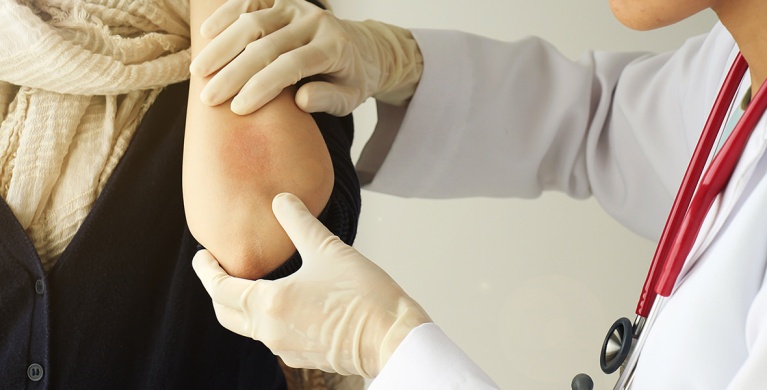

Is eczema an allergy?

Eczema, complete with itching and its all-too-familiar red patches, can be divided into two main types. They have different causes, they progress differently, and they require slightly different treatments. One is an inflammatory contact reaction, most often due to an allergy, and the other is hereditary. So how can you tell if your eczema is caused by a contact allergy?
Allergic contact eczema versus atopic eczema
When costume jewelry earrings cause eczema to break out on the ear, this is a sign of an allergic reaction to the nickel in the earring. This is a classic example of allergic contact eczema.
This type of eczema differs from the other main type, atopic eczema. The latter is linked to atopy, a genetic condition, rather than a contact allergy. Atopy causes a hypersensitivity to the environment which may manifest in the skin, as eczema, or elsewhere in the body, as asthma for example.
In short, certain types of eczema are clearly linked to an allergy following direct contact with a product or object. Others are associated with a genetic hypersensitivity.
Is eczema a contact allergy?
How can you tell if your eczema is caused by an allergic reaction or not? The following questions can help guide you:
Have you shown signs of atopy before?
If you have never experienced signs of atopy, such as asthma for example, and if you have never had eczema before, then you likely have a case of allergic eczema.
Having atopic skin, however, does not eliminate allergic contact eczema as a possibility. In fact, some studies show that atopy may facilitate contact allergies.
Where is it located?
-
When eczema is localized, or limited to a single area of the body, it is often a sign of a contact allergy.
-
Atopic eczema appears over multiple and specific areas (on the elbow folds and behind the knees for example). It is uncommon on the buttocks or the genital region.
Have you come into contact with a product or object, especially in the area affected by eczema?
Sometimes the cause is obvious, like with the earring that triggers a reaction on the earlobe: a clear case of allergic eczema. Be careful, however. An allergic reaction can appear following indirect contact, making it difficult to identify the agent responsible. For example, nail polish can trigger eczema on the neck, which we often touch with our hands. You can even have an allergic reaction to a product touched by another person who then touches you. This is a common occurrence between parents and infants, who are touched constantly! What’s more, eczema appears at least 24 hours after contact with the allergen, which makes finding the culprit all the more challenging.
Certains métiers manuels nécessitent de manipuler régulièrement des produits contenant des allergènes : coiffeurs, métiers du nettoyage, boulangers, fleuristes, ou encore travailleurs dans le bâtiment... Un eczéma, surtout aux mains, peut alors être une allergie liée à votre métier...
An allergy or a simple irritation? Some products can trigger irritant eczema that “burns” and which is not the result of an allergy. This phenomenon is especially common on the hands, when handling detergents or degreasing agents for example.
Can eczema be caused by a food allergy?
Atopic eczema is not a food allergy, but a food allergy can be associated with atopic eczema, presenting as acute urticaria and/or digestive disorders.
Contact eczema, as its name suggests, occurs when an allergen or irritant comes into contact with the skin, and not when we consume food. That being said, some foods may trigger a contact allergy on the skin when you touch or manipulate them. Read our article on protein contact dermatitis for more information.
Can baby develop eczema due to a milk allergy?
2% to 3% of infants are allergic to proteins found in cow’s milk (APLV). The majority experience digestive symptoms. While some exhibit skin reactions, these are cases of urticaria and not eczema. If you suspect a milk allergy, do not stop giving your baby milk “to see what happens”, as this can lead to severe malnutrition. Instead, consult a pediatrician or dermatologist before eliminating any food from your baby’s diet.
Could my eczema be caused by gluten?
No. This is an all-too-common myth with no scientific basis. Eczema is not a symptom of gluten intolerance.
Can you have allergic eczema and atopic eczema at the same time?
Yes, you can. Some experts even argue that atopy facilitates contact allergies. The possibility of having both types of eczema simultaneously should, therefore, be considered. Consult a dermatologist to confirm if this is indeed the case.

